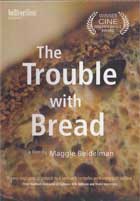
The Trouble with Bread 2013
Distributed by Bullfrog Films, PO Box 149, Oley, PA 19547; 800-543-FROG (3764)
Produced by Maggie Biedelman
Directed by Maggie Biedelman
DVD, color, 26 min.
College - General Adult
Cooking, Food, Documentaries
Date Entered: 12/11/2014
Reviewed by Brandon West, Instructional Design Librarian, State University of New York at OswegoBread has been a staple of human diets for centuries. But in recent years, the food once commonplace in many diets has become demonized and many people have labeled it as unhealthy. Director Maggie Beidelman explores this phenomenon, while seeking answers to her own gluten intolerance, in this 26 minute documentary that delves into the world of the bread industry.
After eating bread her entire life, Beidelman woke up one day to discover that she now becomes physically ill when she consumes it. She goes in search of answers to figure out why she is having this reaction to bread, which she believes stems from a gluten intolerance. After receiving a negative diagnosis for celiac disease, a condition inflamed by consuming gluten, she takes to the road in hopes of learning if her reaction has to do with how bread is made. She visits a wheat farm where she learns how wheat has been crossbred over generations to contain more gluten. Then she treks over to a mill learn how wheat is processed into flour. After learning that much of the healthy content is stripped from mass produced flour, Beidelman visits an artisan bread shop in San Francisco that uses a special fermentation process that helps reduce the gluten content in bread. Through her travels, she learns how current methods of bread production may be the cause of gluten intolerance.
Along her journey, Beidelman meets with farmers, bakers, and more who help enlighten her on the processes used to produce bread. She presents facts about these processes and points out some potentially unhealthy practices, but she never makes any accusations or assumptions; those are left up to the viewer. She acknowledges that she is not a food industry expert, she is just a curious consumer. Her approach allows the documentary to serve as an accessible introduction to the topic of food production and its implications for our health. Beidelman also touches upon the topic of 10.5 billion dollar “gluten-free” industry and sheds some light on the many misperceptions regarding the nature of gluten.
This documentary raises some important questions that everyone should be asking of the food they eat. It has the potential to generate discussion in the classroom about food production and how popular culture preys on society’s ignorance regarding the healthiness of certain foods. At the college level, undergraduate health and wellness programs will likely find value in this documentary. The film comes with a teacher’s guide that can be downloaded from the disc. It contains additional information about the concepts presented in the film and discussion questions. The documentary will also appeal to the general public; in particular, individuals who have questions about bread and gluten will enjoy the film. Overall, it is a worthwhile addition to academic library collections.
Awards
- 2013, CINE Golden Eagle Award